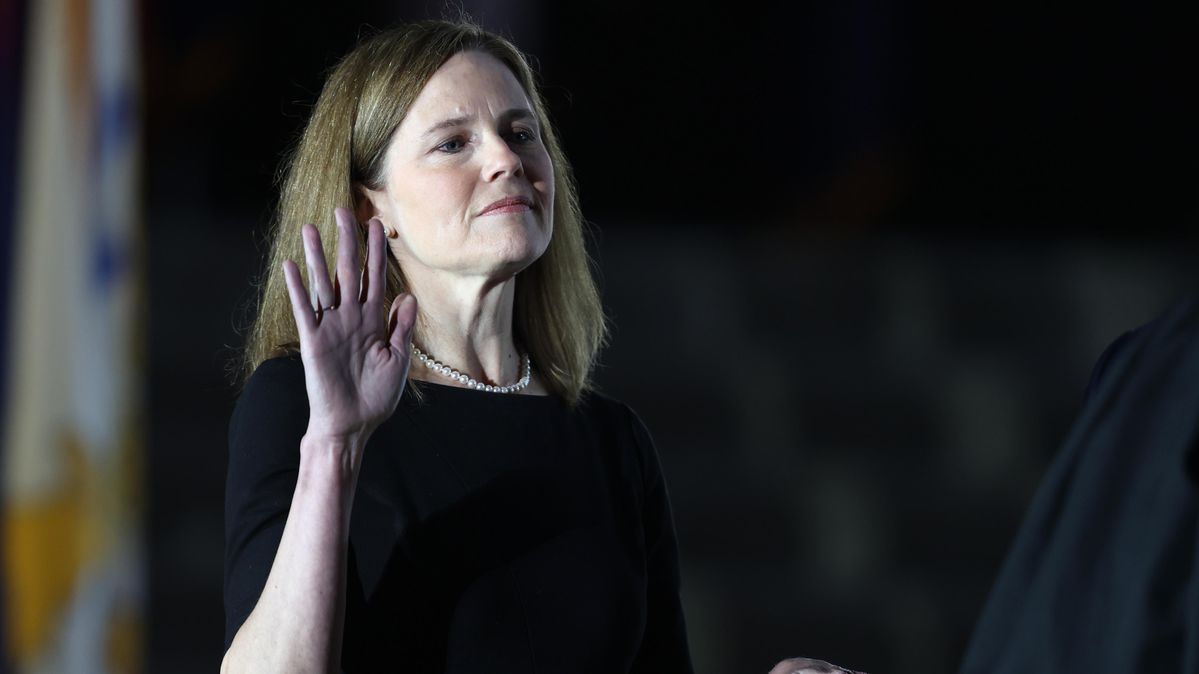Amy Coney Barrett Rebuffs Demands To Recuse From Dark Money Case Involving Group That Supported Her Confirmation
Topline
U.S. Supreme Court Justice Amy Coney Barrett declined to recuse from a case Monday involving a conservative group that spent at least a million dollars supporting her Senate confirmation despite Democrats calling on her to do so because of the alleged conflict of interest it posed.
Key Facts
The Supreme Court heard arguments Monday in Americans for Prosperity Foundation v. Bonta, a case brought by the conservative-leaning Americans for Prosperity Foundation challenging a California policy requiring charities to disclose their donors to the state, which the group alleged violates the First Amendment.
Americans for Prosperity (AFP), a conservative advocacy group backed by billionaire David Koch—which is separate from but linked to the foundation, which focuses on education—launched a major ad campaign urging senators to back Barrett’s confirmation last year, on which they said they planned to spend “seven figures.”
Lawmakers Sen. Sheldon Whitehouse (D-R.I.), Sen. Richard Blumenthal (D-Conn.) and Rep. Hank Johnson (D-Ga.) had sent a letter to Barrett calling on her to recuse from the case or at least publicly state her reasons for not doing so, saying her hearing the case would conflict with past Supreme Court precedent.
Barrett heard the case Monday and did not offer any public statement on her decision to do so, and the Supreme Court has not yet responded to a request for comment on Barrett’s decision not to recuse.
The justice appeared skeptical of the California policy and signaled she may be likely to side with the Americans for Prosperity Foundation during the hearing, telling an attorney for the state of California to “assume that I think these petitioners have shown a substantial burden” the policy imposes on their First Amendment rights.
Whitehouse’s office told Forbes Barrett did not respond to the lawmakers’ letter, and in a statement to Forbes the senator called the justice’s decision not to recuse “another dent in the Court’s credibility.”
Chief Critic
“Justice Barrett is ignoring important ethical standards to rule on a case that could open our democracy to further infiltration by dark-money influence, perhaps permanently,” Whitehouse said in an emailed statement to Forbes Monday. “Her choice to press forward in spite of recusal laws also creates a troubling new precedent, and undermines public confidence in the integrity of the Court.”
Tangent
AFP has also spent large sums of money supporting the confirmations of Justices Neil Gorsuch and Brett Kavanaugh in addition to Barrett. Whitehouse’s office told Forbes last week Barrett’s need to recuse was “especially troubling,” however, because her confirmation took place while the AFP case was pending before the court.
What To Watch For
How the Supreme Court will rule on the case. The conservative-leaning court seemed potentially likely to side with the Americans for Prosperity Foundation Monday, with many of the justices repeatedly pushing back against the attorneys defending California’s policy and expressing skepticism that the donors that are disclosed to them would never be made public as the organization feared. “Do you think it would be reasonable for someone who wants to make a substantial contribution to an organization that has been accused of being racist or homophobic or White supremacist, that in this environment that they would be chilled, because they have reduced or no confidence that their contribution will be kept confidential?” Justice Clarence Thomas asked an attorney defending the policy.
Key Background
Lawmakers’ opposition to Barrett hearing the case is part of a broader concern about the influence that so-called dark money groups have on the court. Whitehouse described the influence of these conservative activist groups and their judiciary spending as a “pretty big deal” during Barrett’s confirmation hearing, and according to expert Senate testimony, conservative activist Leonard Leo has spent more than $400 million on his campaign to influence the judiciary between 2014 and 2018 alone. Whitehouse and Johnson argued in an op-ed for Project Syndicate last week that conservative groups such as AFP donate money to install sympathetic judges, and then bring cases to the court and file coordinated amicus briefs as “the closing movement of a massive court-capture operation.” “The AFP/AFPF operation’s ‘full scale campaign’ for your confirmation makes plain that our judiciary is a target of this massive influence apparatus,” the lawmakers wrote in their letter to Barrett about why she should back down from the case.
Further Reading
Democratic Lawmakers Demand Amy Coney Barrett Withdraw From Dark Money Case Involving Group That Backed Her Confirmation (Forbes)
Supreme Court seems wary of California donor disclosure law (The Hill)












 Bitcoin
Bitcoin  Ethereum
Ethereum  Tether
Tether  XRP
XRP  USDC
USDC  Solana
Solana  TRON
TRON  Dogecoin
Dogecoin  Lido Staked Ether
Lido Staked Ether